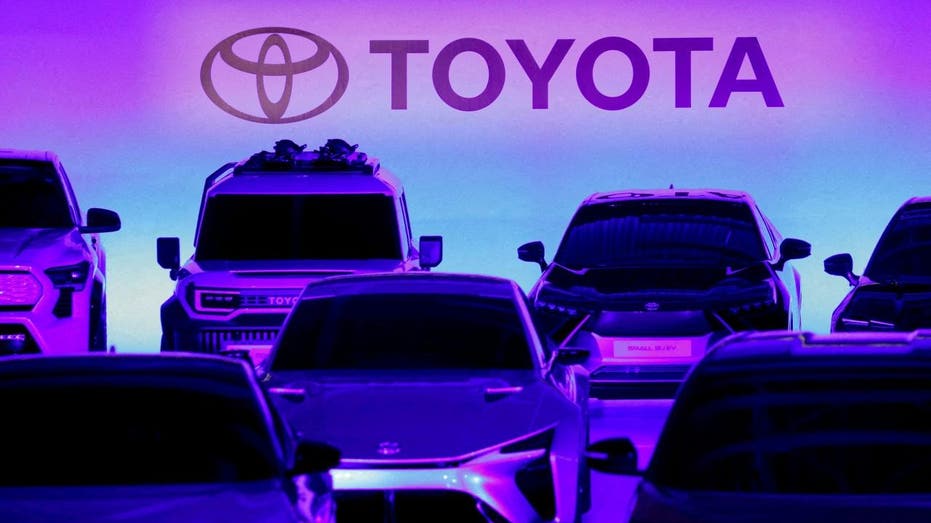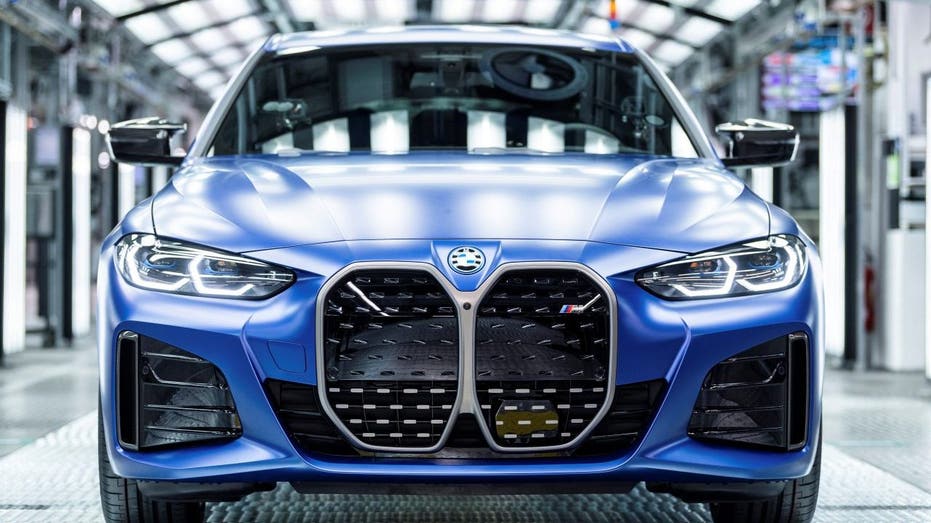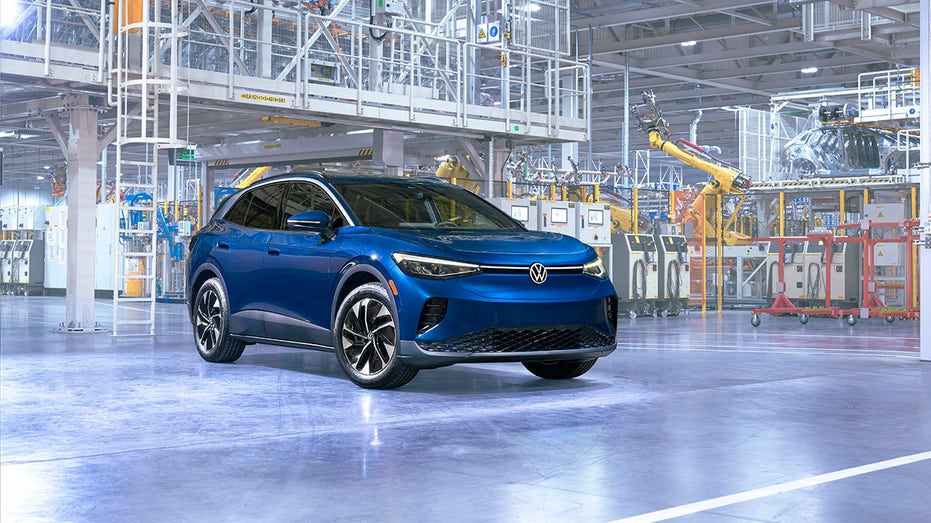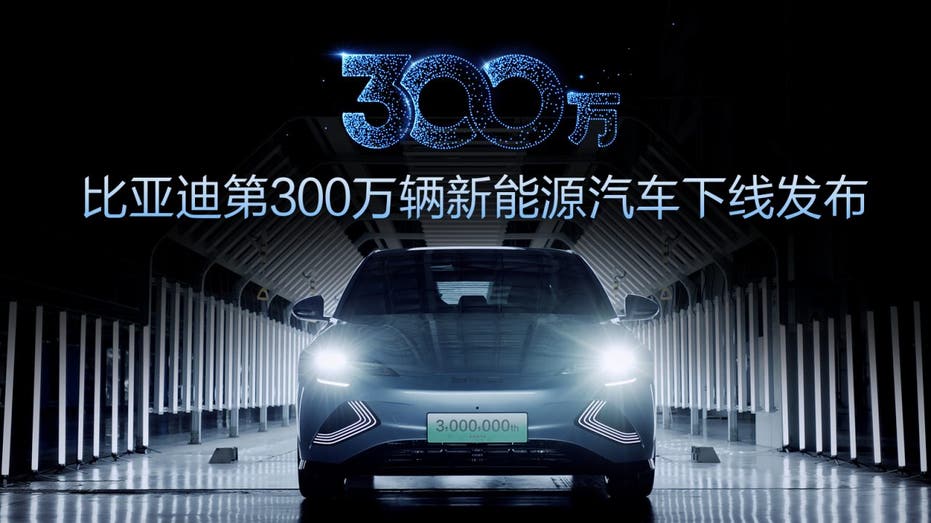EVs made up 10% of all new cars sold last year
China, Europe drive electric-vehicle expansion as US gains traction
Gov. Gavin Newsom puts pause on electric car funding
Rep. Dusty Johnson discusses how California Gov. Gavin Newsom is putting a pause on funding electric car push amid massive budget deficit on ‘The Evening Edit.’
Electric-vehicle sales surged worldwide last year, driven mainly by strong growth in China and Europe, according to fresh data and estimates, providing relief to a broader car market that suffered from economic worries, inflation and production disruptions.
While EVs still make up a fraction of car sales in the U.S., their share of the total market is becoming substantial in Europe and China, and they are increasingly influencing the fortunes of the car market there as the technology goes mainstream.
Worldwide, sales of electric vehicles crossed a key milestone last year, achieving around 10% market share for the first time. Global sales of fully electric vehicles totaled around 7.8 million units, an increase of as much as 68% from the previous year, according to preliminary research from LMC Automotive and EV-Volumes.com, research groups that track automotive sales.

Toyota cars are seen at a briefing on the company's strategies on battery EVs in Tokyo, Japan, December 14, 2021. REUTERS/Kim Kyung-Hoon/File Photo (AP Newsroom)
Ralf Brandstätter, the head of Volkswagen AG’s China business, told reporters on Friday that electric vehicles would continue expanding fast and that China could soon reach a point where sales of conventional vehicles begin to permanently decline as plug-in vehicles take bigger market share.
RUSSIAN CAR SALES DOWN 58.8% IN 2022 AS SANCTIONS HIT AUTO INDUSTRY HARD
"Last year, every fourth vehicle we sold in China was a plug-in, and this year it will be every third auto," Mr. Brandstätter said. "We haven’t reached the tipping point yet, but we’re expecting to get there between 2025 and 2030."
For the full year, fully electric vehicles accounted for 11% of total car sales in Europe and 19% in China, according to LMC Automotive. Combined with plug-in hybrid vehicles, which can be plugged in to recharge the battery but also have a small combustion engine, the share of electric vehicles sold in Europe rose to 20.3% of the total last year, according to EV-Volumes.com.
In Germany, the largest auto market in Europe, electric vehicles accounted for 25% of new vehicle production last year, according to VDA, the German automotive manufacturers association. In December, there were more EVs sold in the country than conventional cars.

A BMW i4 Electrical car is seen during a visit of the German Economic and Climate Protection Minister at the BMW plant in Munich, Germany, January 20, 2022. REUTERS/Lukas Barth/File Photo (Reuters Photos)
New-car sales overall fell around 1% to 80.6 million vehicles, according to the LMC data, with nearly 4% growth in China helping to offset a decline of 8% in the U.S. and 7% in Europe, which was hit by the weakening global economy, soaring energy costs, supply-chain disruptions and the war in Ukraine.
Bayerische Motoren Werke AG, the German luxury-car maker, was one of many manufacturers last year to see sales of plug-in models rise even as overall sales tumbled. BMW reported a 5% decline in total new-car sales but saw EV sales more than double last year.
| Ticker | Security | Last | Change | Change % |
|---|---|---|---|---|
| BMWYY | NO DATA AVAILABLE | - | - | - |
"We are confident that we can repeat this success next year, because we have a continued high order backlog for fully electric models," BMW sales chief Pieter Nota, said this month, commenting on the growth in sales of electric models.
FORD CEO JIM FARLEY TO RACE AT DAYTONA
VW, Europe’s biggest manufacturer by sales, said on Thursday that overall new-car sales fell 7% to 8.3 million vehicles last year, but sales of electric vehicles rose 26% to 572,100 units. The sales figures encompass the company’s large stable of brands, including VW, sports-car maker Porsche, luxury-car brand Audi and passenger-car brands Skoda and Seat.

Volkswagen ID.4 is an electric vehicle produced in Germany. (Volkswagen / Fox News)
The bulk of VW’s sales of EVs were in Europe, but sales growth was strongest in China and the U.S., the company said.
TESLA OWNERS FEEL 'DUPED' AFTER COMPANY SLASHES PRICES
Other manufacturers reported a similar divide of strong growth in sales of electric cars—boosted in part by the availability of a wider array of models in addition to market leader Tesla Inc.—and weak or declining sales of conventional vehicles. Ford Motor Co., Mercedes-Benz Group AG and BMW each said their EV sales more than doubled in 2022, while their total vehicle sales declined.
| Ticker | Security | Last | Change | Change % |
|---|---|---|---|---|
| TSLA | TESLA INC. | 411.11 | +13.90 | +3.50% |
| F | FORD MOTOR CO. | 13.80 | +0.08 | +0.58% |
European auto makers have focused their EV production and sales on home markets as they try to meet European Union emissions regulations. They also began last year to more aggressively expand their EV business in other major markets, especially China and the U.S.
In China, which accounted for around two-thirds of global sales of fully electric cars last year, domestic manufacturers are gaining ground on traditional Western auto makers and are also beginning to expand into Europe and the U.S.

BYD Rolls Off Its 3 Millionth New Energy Vehicle and Debuts A New Passenger Car Brand Matrix. Nov. 18, 2022 (AP Newsroom)
Worldwide, Tesla maintained the top spot in a global ranking of manufacturers by sales of all-electric vehicles, followed by Chinese manufacturers BYD Co. and SAIC Motor Corp., and brands belonging to the VW group, according to a study published by Stefan Bratzel, director of the Center of Automotive Management, an automotive-research group in Germany.
HERE'S HOW MANY LINCOLN DEALERS WANT TO SELL ELECTRIC VEHICLES
The U.S. lags behind China and Europe in the rollout of EVs, but last year auto makers sold 807,180 fully electric vehicles in the U.S., a rise in the share of all-electric vehicles to 5.8% of all vehicles sold from 3.2% the year before. Tesla is still the world’s dominant EV maker, but conventional auto makers are shortening its lead with new electric-model launches.
Ford is now the second-largest maker of EVs by sales in the U.S., followed by Hyundai Motor Co. and its affiliate Kia Corp. Meanwhile, General Motors Co., VW and Nissan Motor Co. lost EV market share in the U.S. last year.
| Ticker | Security | Last | Change | Change % |
|---|---|---|---|---|
| HYMTF | NO DATA AVAILABLE | - | - | - |
| GM | GENERAL MOTORS CO. | 84.24 | +0.94 | +1.13% |
Analysts warn that repeating last year’s strong EV performance in 2023 could be difficult as economic worries weigh on consumers, and cash rebates on EVs are reduced or scrapped completely in some countries. Rising electricity prices in Europe in the wake of Russia’s attack on Ukraine have also diminished the appeal of EVs compared with gas-powered cars.

German Chancellor Olaf Scholz, left, talks to Elon Musk, Tesla CEO, at the opening of the Tesla factory Berlin Brandenburg in Gruenheide, Germany, Tuesday, March 22, 2022. The first European factory in Gruenheide, designed for 500,000 vehicles per ye ((Patrick Pleul/Pool via AP) / AP Newsroom)
Germany witnessed a surge in last-minute EV purchases in December, as consumers rushed to take advantage of government incentives before they were cut this year. Since Jan. 1, government subsidies for the purchase of an EV with a listing price of up to 40,000 euros fell to 4,500 euros from 6,000 euros previously.
For the past couple of years, auto makers, especially in Europe, have struggled to find key components such as computer chips to maintain production in pace with demand. This mismatch between demand and supply is one reason auto makers posted lofty profits last year despite broadly weaker sales.
CLICK HERE TO GET THE FOX BUSINESS APP
As the economy weakens, supply-chain problems ease and subsidies dry up, manufacturers could find it harder to maintain the high prices for new cars as they chase potentially fewer buying customers. This could result in a downward price spiral that potentially hits profits.
"Demand is likely to weaken in the coming year," said Peter Fuss, an auto analyst with Ernst & Young. "The weak economy will cause retail and business consumers to be more reluctant. And it is possible that supply will outpace demand and we will begin to see discounts again."




















